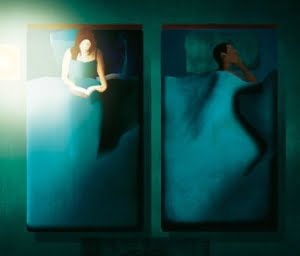 Sleep is essential for a person’s health and well-being, according to the National Sleep Foundation (NSF). Yet millions of people do not get enough sleep and many suffer from lack of sleep. For example, surveys conducted by the NSF (1999-2004) reveal that at least 40 million Americans suffer from over 70 different sleep disorders and 60 percent of adults report having sleep problems a few nights a week or more.
Sleep is essential for a person’s health and well-being, according to the National Sleep Foundation (NSF). Yet millions of people do not get enough sleep and many suffer from lack of sleep. For example, surveys conducted by the NSF (1999-2004) reveal that at least 40 million Americans suffer from over 70 different sleep disorders and 60 percent of adults report having sleep problems a few nights a week or more.
Most of those with these problems go undiagnosed and untreated. In addition, more than 40 percent of adults experience daytime sleepiness severe enough to interfere with their daily activities at least a few days each month – with 20 percent reporting problem sleepiness a few days a week or more. Furthermore, 69 percent of children experience one or more sleep problems a few nights or more during a week.
Most adults need 7-8 hours of interrupted sleep each night to function well. While you might think sleeping is automatic, many people fall into habits that dramatically affect their ability to get adequate sleep. Unhealthy sleeping habits can develop in high school and follow a person through to adulthood. Habits like eating before bed, watching television, exercising late at night and even reading may impact someone’s ability to fall and stay sleep. Once formed, many of these habits can be difficult to break without assistance.
Harvard Health Publications suggested six reasons to get enough sleep:
- Learning and memory: Sleep helps the brain commit new information to memory through a process called memory consolidation. In studies, people who’d slept after learning a task did better on tests later.
- Metabolism and weight: Chronic sleep deprivation may cause weight gain by affecting the way our bodies process and store carbohydrates, and by altering levels of hormones that affect our appetite.
- Safety: Sleep debt contributes to a greater tendency to fall asleep during the daytime. These lapses may cause falls and mistakes such as medical errors, air traffic mishaps, and road accidents.
- Mood: Sleep loss may result in irritability, impatience, inability to concentrate, and moodiness. Too little sleep can also leave you too tired to do the things you like to do.
- Cardiovascular health: Serious sleep disorders have been linked to hypertension, increased stress hormone levels, and irregular heartbeat.
- Disease: Sleep deprivation alters immune function, including the activity of the body’s killer cells. Keeping up with sleep may also help fight cancer.
According to sleep experts, stress is the number one cause of short-term sleeping difficulties. Common triggers include school- or job-related pressures, a family or marriage problem and a serious illness or death in the family. Usually the sleep problem disappears when the stressful situation passes. However, if short-term sleep problems such as insomnia aren’t managed properly from the beginning, they can persist long after the original stress has passed.
More serious causes of sleep difficulties include physical health problems such as arthritis and other conditions that cause pain, backache, or discomfort. Sleeping disorders are also associated with some psychiatric disorders including major depressive disorder (includes postpartum blues), minor depression, dythymia, mixed anxiety-depression, SAD and bipolar disorder. One of the most common symptoms of depression is insomnia.
According to the American Psychological Association, cognitive-behavior therapy, one of the many forms of therapy used by Capital EAP counselors, has a 70-80 percent success rate for helping those who suffer from chronic insomnia. Further, when insomnia exists along with other psychological disorders like depression, these therapies can help to address the underlying condition that may be causing sleeplessness.
Addressing the causes of sleeplessness can have an immensely beneficial impact on your physical health, your emotional well-being, thinking and behavior, and ultimately, your happiness. If you or a family member is having trouble sleeping, contact Capital EAP and talk with a Capital EAP counselor.
